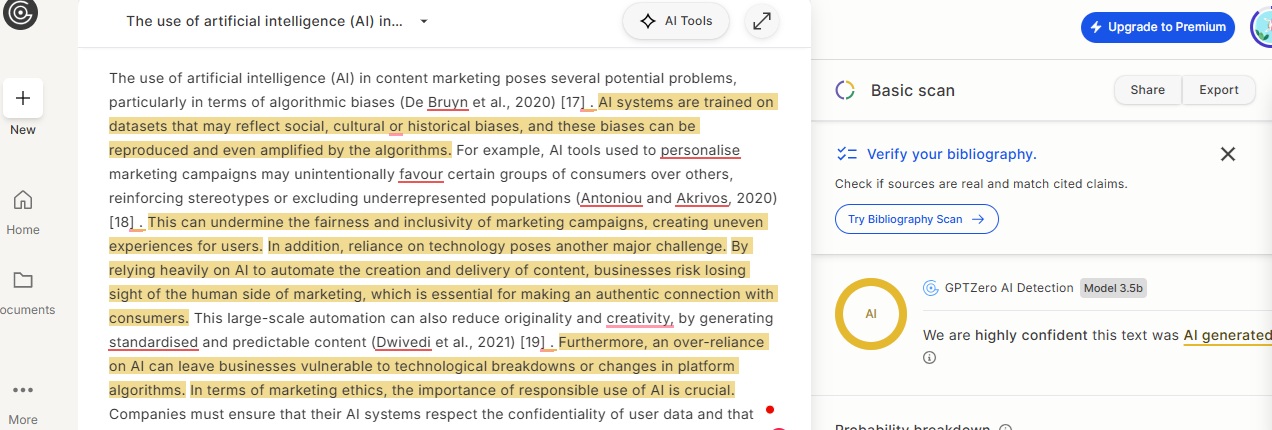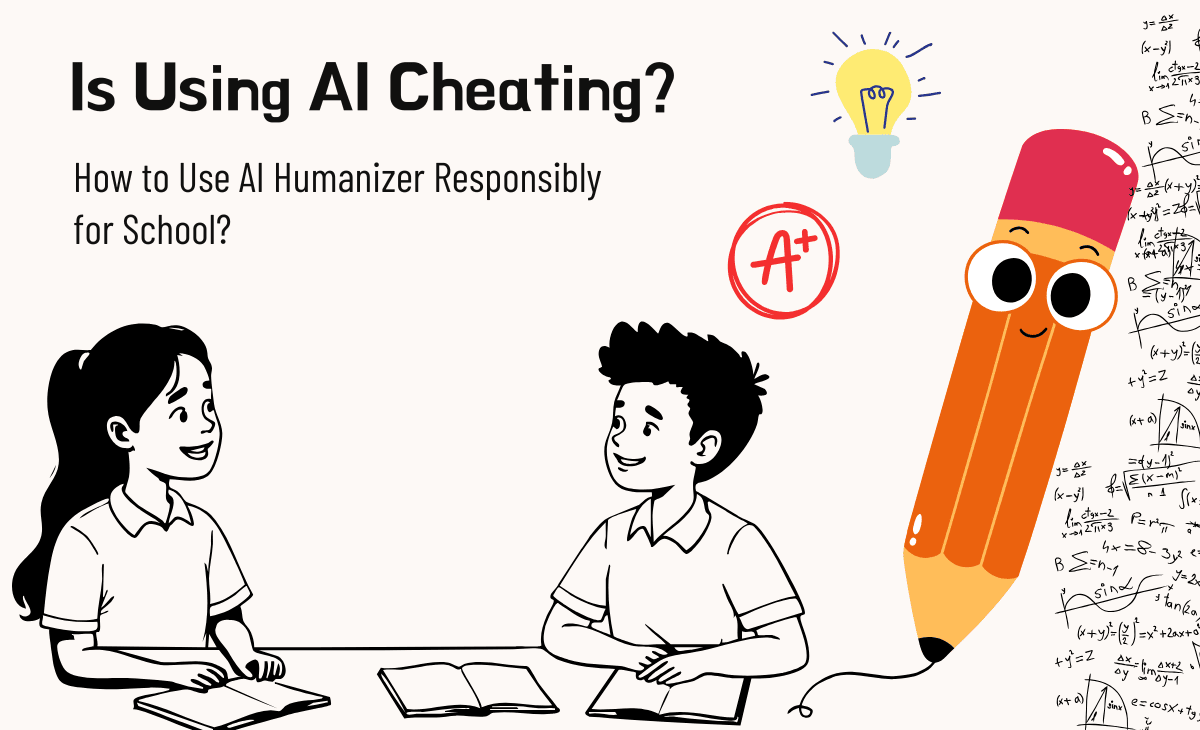A tool like ChatGPT, Claude, or Gemini can answer every question in the book in seconds. It can even write and research all in just one click. But this is where the dilemma begins for the students. On the one hand, there is speed and efficiency, and on the other, there’s ethics.
It puts students in a tough spot. They are constantly questioning whether using AI gives them an unfair advantage and asking the bigger question: Is using AI cheating?. But as they try to navigate this gray area, another issue complicates things: their work is being wrongly flagged as AI-generated.
Not every student writes the same or thinks in the same way. There can be situations where narratives can be a bit rigid. But then, how does one know if AI is involved in it? And if so, where do we draw the line to protect academic credibility?
What Counts as Cheating When Using AI in School?
The use of Artificial Intelligence in schools is drastically different from its usage in a marketing setup. The stakes are way too high and can even deter the flow of someone’s entire life. Hence, we must first understand the exact boundaries of what constitutes cheating.
The concept of cheating in school is about having an undue advantage over others. It means accessing material that can help resolve the given task or write a given exam with ease and accuracy. Think about it this way: a student using AI to write a paper or an assignment will always have a better outcome (for the moment) than a student who doesn't.
But a setup like this is toxic and unfair for someone who has prepared to ace the exam for months. Not only that, solely relying on AI can even disrupt the learning process and a hunger for knowledge in a student’s formative years. Along with that, it also robs the students of having a unique, creative perspective.
So, to ensure the academic safety of the students, the schools came up with the concept of AI detection. As in using an AI detector to see if a given piece of work by a student has any machine-generated residue.
But this complicates things further.
The Problem With AI Detectors Like GPTZero
The top reputed institutes these days are known to rely on AI detectors to make sure that no student uses AI. They are extremely strict with this and are known to reject candidates who can't pass detection.
Now, I am not talking about a simple mid-term or a class test. Students have been known to get rejected from important admissions, assignments, and probably tests because GPTZero thought it was AI.
That's where the problem lies when relying on a tool like this. As it is not aware of the context and intent, GPTZero has been called out multiple times for flagging a given content incorrectly.
Here’s a quick look at the situation as GPTZero tries to work with a paper written by Yassine Elkhatibi, Redouane Benabdelouhed, called Digital Revolution: How AI is Transforming Content Marketing.

It is alarming to see that GPTZero was quick to flag a paper that was written by humans on a real-time basis. The reason behind it was very obvious: the tool picked up phrases that are supposedly used by AI.
A situation like this makes us wonder whether it is practically correct to rely on a tool that confuses the obvious cues while making a decision about somebody’s future.
So we are back to square one, wondering if the use of AI should be allowed and how to avoid the malfunctions of any popular AI detector.
Why is AI important in a Classroom Setting?
The plus side of using AI in a classroom setup is many. The first and most important being that it makes education accessible for everyone. A teacher or an educator can't focus on every child in a classroom setting. Moreover, not everyone’s knowledge-gaining capacity is the same. Some take more time than others.
But having access to tools like ChatGPT, Elicit, Paperguide, Claude, and others ensures that the child never leaves the classroom setting. As a student, you can ask any question that you want at any given time, and you will always get the answer instantly.
💡 Fun Fact: The term artificial intelligence was coined way back in 1956.
Moreover, it’s especially helpful for students who are non-native English speakers or have learning disabilities. Artificial intelligence makes learning easier and more inclusive for them and makes going to school a fond experience.
The Concerns Around AI Use in Schools
But as we become more accepting of AI, there are always some major concerns that make us skeptical. It raised some important questions, especially around ethics, misuse, and long-term impact.
Over-Reliance on AI
As a student starts relying on AI for everything, they let go of their critical thinking skills. This results in a decrease in critical thinking, problem-solving, and self-directed learning.
Academic Integrity Risks
When a student starts using AI, who decides where to draw the line? Using AI to complete assignments without proper editing or understanding can cross into cheating territory and sabotage the entire learning process.
Inaccurate Detection
As discussed earlier, tools like GPTZero can flag even human-written content, leading to unnecessary academic penalties and stress for students. Moreover, some institutes even reject the entire candidature the moment they see AI is involved.
Widening the Gap
Artificial Intelligence is still a fairly new concept for students, and not all students have access to all the premium tools. While AI can make education more inclusive, it can also increase the digital divide.
💻 Quick Stats: While AI tools like ChatGPT are free, only 1 in 3 students globally have stable internet access and digital literacy to use them effectively. (Source: World Bank, 2023).
Tips to Keep Your AI Use Transparent and Smart
Now, the important question that arises is how do we maintain a balance of not exploiting AI but also not giving up on it altogether? There are obvious concerns with its usage, that’s true, but its benefits are also something that might upgrade our entire learning process. AI makes education accessible and ensures that no one is left behind, but using it requires some non-negotiable precautions.
- Give Credit When Needed: Being transparent solves all the major concerns when it comes to AI. Some schools are yet to catch up on this standard, but for some schools it is mandatory to disclose AI assistance in footnotes or citations, just like any other source. If you acknowledge this as a standard practice, it will help you maintain integrity and transparency.
- Know Your School’s Rules: We are yet to have a uniform guideline for the use of AI in schools. Some may allow it for idea generation or grammar fixes, while others might have strict rules against any kind of AI-generated content. So, the responsibility lies with you to make sure you familiarize yourself with the expectations and structure your work accordingly.
- Don’t Copy-Paste Full Answers: AI is there to help you with the research and assist you with the flaws in your writing. But the moment you let it control the entire process, you are entering the cheating territory. Not only can your work be flagged by detectors like GPTZero or Turnitin, but it also means you are willingly skipping the learning process. Exams, quizzes, and take-home assignments are meant to test your understanding and assess your learning.
- Ask When in Doubt: If you are unsure of what your school’s policy is with AI, you can always ask your faculty. They can clarify what's allowed and what isn't. Being open about your approach shows that you are open about your intentions and helps build trust with your school authorities.
- Use AI Humanizers Smartly: A tool like Humanize AI is a great way to refine your tone and structure in case of a wrongful AI detection. It doesn’t do the work for you but makes sure your voice and intent are never compromised.
How to Use Humanize AI Responsibly as a Student
As we have been discussing, there is a need for a tool like Humanize AI because the detectors aren’t reliable. They tend to flag anything that follows a common pattern or relies on some commonly used phrases. Not only that, it is demotivating to be penalized for using AI even when you haven’t. But with an ease of access comes responsibility; otherwise, it defies the entire purpose.
But with easy access comes responsibility, and without it, the purpose of using AI meaningfully is lost.
You can always rely on ChatGPT or Claude to brainstorm. As you put it into words, you can always rely on Humanize AI to smooth the rough ends. But the idea should be yours, which will reflect your individuality and help your teachers to assess you accordingly.
💡Fun Fact: Sometimes, to beat AI detection, the students tend to sneak in some deliberate mistakes to make it sound more human.
Submitting an unedited idea doesn’t just risk getting flagged; it also reflects your preference for missing out on the opportunity to think, reflect, and grow. Tools like Humanize AI are designed to support your writing, not to take over the thinking for you. That means using it to improve clarity, fix awkward phrasing, or make your tone sound more natural.
AI Isn’t the Enemy, Misuse Is
To sum it all up, you have to understand that tools like Humanize AI are designed to support your writing, not to take over the thinking for you. It is up to you to ensure that you utilize AI effectively and leverage it to enhance your process. Humanize AI is only there to improve clarity, fix awkward phrasing, or make your tone sound more natural.
But the real, actual work of researching, outlining, and forming your own ideas is solely your responsibility. Most importantly, it is important for you not to forget that if you rely on AI to do the thinking for you, you miss out on the real learning process. But when you use Humanize AI to refine your original work, it becomes a tool for growth. It helps you improve your writing, maintain academic integrity, and build trust with your teachers.

